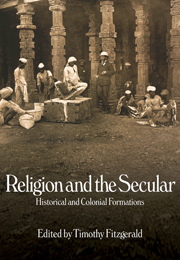Book contents
- Frontmatter
- Dedication
- Contents
- Acknowledgements
- Contributors
- Introduction
- 1 Dialectics of conversion: Las Casas and Maya colonial Congregación
- 2 A higher ground: the secular knowledge of objects of religious devotion
- 3 Secularizing the land: the impact of the Alaskan Native Claims Settlement Act on indigenous understandings of land
- 4 The formative process of State Shinto in relation to the Westernization of Japan: the concept of ‘religion’ and ‘Shinto’
- 5 Religious and secular in the Vietnam War: the emergence of highland ethno-nationalism
- 6 Colonialism all the way down? Religion and the secular in early modern writing on south India
- 7 Understanding politics through performance in colonial and postcolonial India
- 8 Real and imagined: imperial inventions of religion in colonial southern Africa
- 9 Religion in modern Islamic thought and practice
- 10 Rudolf Otto, cultural colonialism and the ‘discovery’ of the holy
- 11 Encompassing Religion, privatized religions and the invention of modern politics
- 12 Colonialism and the myth of religious violence
- Index
12 - Colonialism and the myth of religious violence
- Frontmatter
- Dedication
- Contents
- Acknowledgements
- Contributors
- Introduction
- 1 Dialectics of conversion: Las Casas and Maya colonial Congregación
- 2 A higher ground: the secular knowledge of objects of religious devotion
- 3 Secularizing the land: the impact of the Alaskan Native Claims Settlement Act on indigenous understandings of land
- 4 The formative process of State Shinto in relation to the Westernization of Japan: the concept of ‘religion’ and ‘Shinto’
- 5 Religious and secular in the Vietnam War: the emergence of highland ethno-nationalism
- 6 Colonialism all the way down? Religion and the secular in early modern writing on south India
- 7 Understanding politics through performance in colonial and postcolonial India
- 8 Real and imagined: imperial inventions of religion in colonial southern Africa
- 9 Religion in modern Islamic thought and practice
- 10 Rudolf Otto, cultural colonialism and the ‘discovery’ of the holy
- 11 Encompassing Religion, privatized religions and the invention of modern politics
- 12 Colonialism and the myth of religious violence
- Index
Summary
The idea that religion has a peculiar tendency toward violence has inspired a host of scholarly books exploring this thesis. At the same time, a significant group of scholars has been questioning whether ‘religion’ even exists, except as an intellectual construct of highly dubious value. The first group of scholars carries on as if the second group did not exist. In this chapter I shall bring the two together.
This may sound as though I am setting up a tedious border skirmish among academics who thrive on haggling over definitions, but I am convinced that there are important implications for the study of colonialism. Once we begin to ask what the ‘religion and violence’ arguments mean by ‘religion’, we find that their explanatory power is hobbled by a number of indefensible assumptions about what does and does not count as ‘religion’. Certain types of practices and institutions are condemned, while others are arbitrarily ignored. Why? My hypothesis is that ‘religion and violence’ arguments serve a particular need for their consumers in the West. These arguments are part of a broader Enlightenment narrative that invents a dichotomy between the religious and the secular and constructs the former as an irrational and dangerous impulse that must give way in public to rational, secular forms of power.
- Type
- Chapter
- Information
- Religion and the SecularHistorical and Colonial Formations, pp. 241 - 262Publisher: Acumen PublishingPrint publication year: 2007



